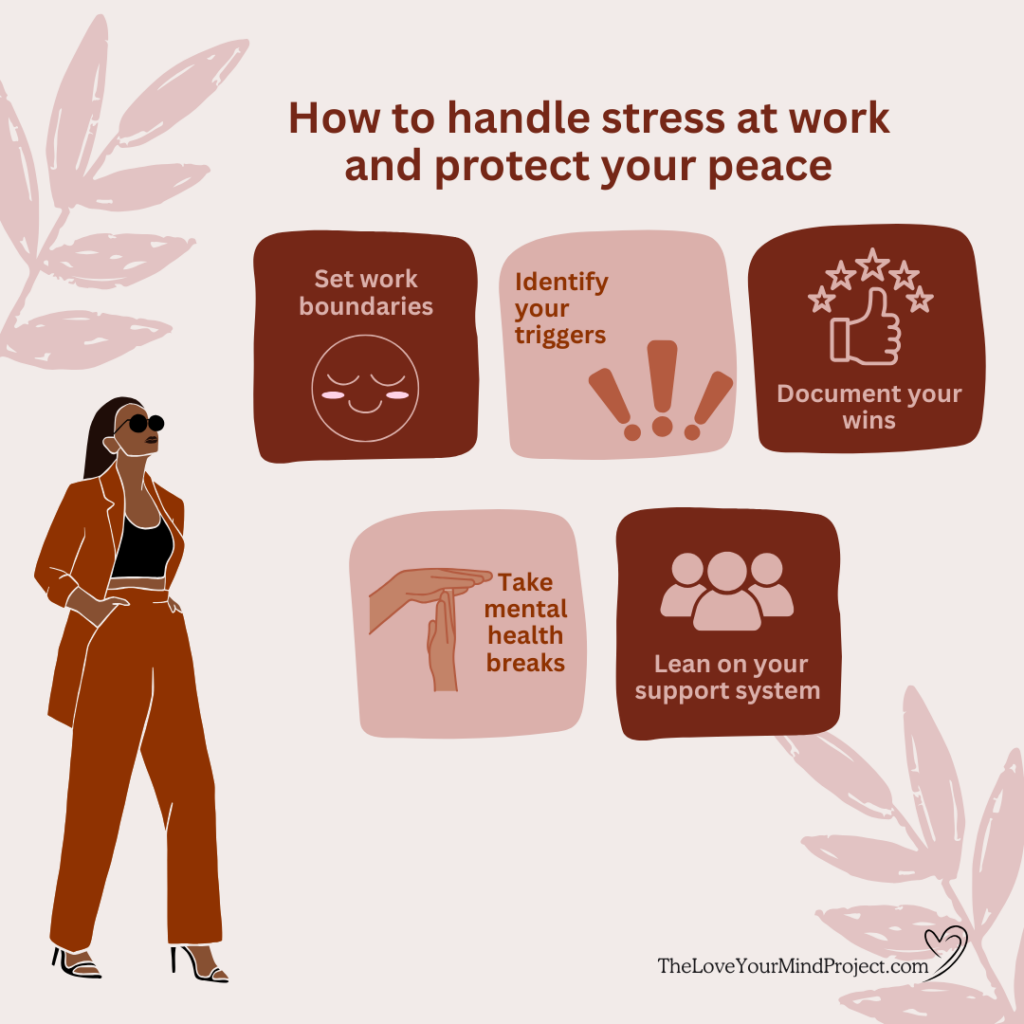- How emotions show up in the body (and why it matters) - February 6, 2026
- How to heal from emotional abuse: A Black woman’s guide to gentle rebuilding - January 29, 2026
- How to process emotions: What it really means and why it’s essential for Black women - January 22, 2026
For many Black women, work stress is more than heavy workloads and tight deadlines. It can be overwhelming and debilitating—protecting your peace is paramount.

We’re told as little girls that we must work twice as hard to be seen as equal. So we over-deliver. We show up early, stay late, and take on the extra work, often without complaint.
For many Black women, perfectionism, overachieving, and people-pleasing feel like a minimum requirement to survive in corporate. And even when we give our all, we’re still less likely to be promoted or paid fairly 1,2.
“Whether we are in the workplace, school, or health system, we are victims of the ongoing unaddressed biases in this country that impact our health and how we navigate the world,” said Anim Aweh, LCSW and co-founder of Aweh Support, a corporate wellness company.
The truth? That level of pressure is not sustainable. Workplace stress can take a toll on our emotional and mental health. This article breaks down what workplace stress looks like for many of us, and what you can do to guard your overall wellness.
What's in this article?
Work stress hits differently for Black women
Stress at work is common, but for Black women, there are usually layers. Here are just a few ways work stress can show up.
Pressure to be palatable: Have a pleasant tone. Don’t be too direct. Show confidence, but don’t be intimidating. The constant effort to not be too much or too little leaves many of us code-switching, changing our dialect, voice, or mannerisms to make others comfortable 3.
Processing microaggressions 1: From questions about our hair to backhanded compliments like “you’re so articulate,” Black women often navigate subtle slights that can chip away at our peace and confidence.
Fighting to be seen: It can feel like our contributions go unnoticed no matter how hard we work. Many Black women are undervalued and under-recognized, especially when it’s time for promotions 1.
Lack of support: Black women don’t often have the same support from managers or other leaders in the office. Mentors or trusting coworkers can also be hard to come by, leaving many feeling alone in the struggle 4.
Pushing through it: Even though work stress can derive from multiple sources, there’s often an expectation to carry it well and not show that we’re struggling.
“Many of us learned to be strong, keep pushing on, or just pray,” shared Aweh. “Our socialization teaches us to ignore stress, preventing proper recovery from its adverse, long-term effects. Burnout is the direct byproduct of ignored stress in the workplace or your personal life.”
>> Read more about mental health: How to choose self-love over stigma
Signs that the work stress is too much
Unchecked job stress can lead to or intensify symptoms of anxiety, depression, and burnout. Here are some signs that workplace stress is impacting your mental health.
- Chronic fatigue, even with enough sleep.
- Constant dread or deep loss of motivation.
- Feeling irritable, anxious, or on edge.
- Pulling away from friends or loved ones.
- Struggling to feel confident or worthy.
How to handle work stress (and protect your mental health)
If your job regularly leaves you emotionally drained, you don’t have to sit and suffer. There are a few strategies you can explore to support your well-being.
“Take physical steps to care for yourself, remove yourself from the identified stress, and ensure your safety,” advised Aweh. “This includes resetting expectations, identifying triggers, and leaning on your community.”

Establish work boundaries
When work asks too much of you or has you constantly stressed, angry, or second-guessing yourself, set physical and mental boundaries to protect your wellness. A boundary can look like not responding to emails over the weekend or using your lunch as a mental health break.
Identify your triggers
Pay close attention when you feel hyper-stressed, angry, or emotional at work. What was said or done that’s feeding your mood? What emotions do you feel? Allowing yourself this space to feel, without judgment, can help calm your nerves or reveal when it’s time to remove yourself from a toxic situation.
Document your wins
Self-validation matters when you’re overlooked or undervalued at work. Keep a file that outlines your accomplishments, big and small. Review your wins on those days you feel inadequate, and bring them up strategically in your check-ins and performance reviews.
Take mental health breaks
Even two minutes can make a difference. Set aside brief moments to process difficult emotions or simply check in on what you’re feeling. This could be a quick walk to the break room or a few slow, deep breaths at your desk.
“Focus on cognitive recovery where you create routines that feel sustainable,” said Aweh. “I always say your job will probably not change, but you can develop the tools you need to thrive there.”
Lean on your support system
A mentor or trusted coworker can help you process what you’re experiencing and help guide and encourage you through it. Your community doesn’t have to be in the workplace and could include professional help, like a therapist or support group. But it’s important to have a space to share, unload, and be reminded that you’re not alone.
>> Learn more about therapy: How it can help you heal
Know when it’s time to move on
Your peace does matter. It may be time to explore your job options if the stress from work leads to anxiety, depression, sleepless nights, or if you feel unsafe. That may not look like quitting on the spot. But perhaps you can create a plan for your next move—one that includes exploring current employer benefits.
“I frequently advocate for the Family Medical Leave Act,” Aweh added. “FMLA allows you to step away from the stress and focus on restorative recovery.”
When to reach out for support
Not everyone can walk away from a toxic job, but you can get help managing the stress. You deserve a workplace that acknowledges and respects your humanity, not demeans or drains you.
A licensed therapist can help you create workplace boundaries, process troubling experiences, and decide on your next steps with clarity and confidence.
>> Subscribe to the Love Your Mind Project newsletter
Work stress FAQs
How much work stress is too much?
If your job regularly affects your sleep, appetite, mood, or relationships, the stress may be too much. Chronic stress can impact your mental and physical health. And you don’t have to wait until you hit a breaking point to get support.
What do you do when your job is too stressful?
Start by setting boundaries to protect your mental space. Take short mental health breaks throughout the day and lean on your mentors, friends, or a therapist for support. Validate yourself by documenting and reviewing your work accomplishments. If the stress from work is too much, consider creating a long-term plan to move on.
How do I set boundaries at work without fear of backlash?
Workplace boundaries can be beneficial to both the employer and the employee. Show how your boundaries align with your own and the company’s values. Share your expectations with your manager and gain alignment. Make sure you both agree on how to move forward when someone crosses a boundary.
References
1 Krivkovich, A., Field, E., Yee, L., McConnell, M., & Smith, H. (2024, September 17). Women in the Workplace 2024: The 10th-anniversary report. McKinsey & Company. https://www.mckinsey.com/featured-insights/diversity-and-inclusion/women-in-the-workplace
2 US Department of Labor releases research on continued economic effects of job segregation, pay disparities on Black, Hispanic women. (2025). DOL. https://www.dol.gov/newsroom/releases/wb/wb20240312
3 Johnson, D. G., Mattan, B. D., Flores, N., Lauharatanahirun, N., & Falk, E. B. (2021). Social-Cognitive and Affective Antecedents of Code Switching and the Consequences of Linguistic Racism for Black People and People of Color. Affective Science, 3(1), 5–13. https://doi.org/10.1007/s42761-021-00072-8
4 The State of Black Women in Corporate America. (2024). Lean In. https://leanin.org/research/state-of-black-women-in-corporate-america/section-2-support-at-work#!
